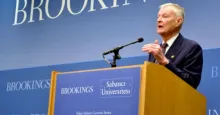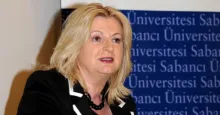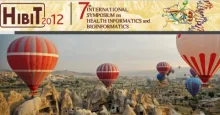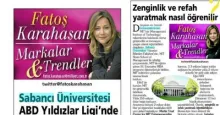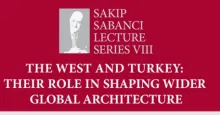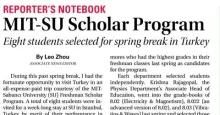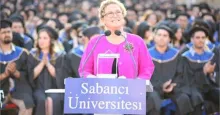04/05/2012
Former US National Security Advisor Zbigniew Brzezinski:
“As one of the top 4 NATO members, Turkey will play a critical part in the security of Europe and the West.”
“The greatest threat of the century is climate change, and it threatens the entire planet.”

Sabancı University and Brookings Institution held the eighth Sakıp Sabancı Lecture. Held in memory of the Honorary Chairman of the Sabancı University Board of Trustees, the lecture this year featured former US National Security Advisor Zbigniew Brzezinski as keynote.
The eighth Sakıp Sabancı Lecture by Sabancı University and Brookings Institution was held in Washington DC on Wednesday, May 2, 2012. The lecture was given by former US National Security Advisor Zbigniew Brzezinski. A leading expert in global politics and security, Brzezinski’s lecture titled "Turkey and the West: Their Roles in Shaping the Global Architecture” discussed critical issues such as global leadership, balance of power, the positions of the US and Europe, and the role of Turkey as a EU member candidate and an important ally of the US.
The Lecture in Washington was televised live at the Sabancı University campus in Tuzla, Turkey via live videoLecture. The opening speech was made by Sabancı University Board of Trustees Chair Güler Sabancı.

Güler Sabancı said that the lecture honored the memory of the late Sakıp Sabancı, who stood for freedom of speech all his life, he believed in a free market and defended free enterprise. Moreover, said Güler Sabancı, he recognized the importance of international collaboration in order to achieve lasting peace and stability; and to leave a sustainable tomorrow for posterity. Güler Sabancı continued, “Since 2005, this lecture has offered a platform for many statesmen and dignitaries who cherish these principles and project them through their work. This year's lecture and keynote speaker also come at a vital crossroads. The world is going through a major global shift. The balance of power is no longer tilted in favor of the West. And nor is it solely shaped by the unilateral interests of the United States and Europe. Regional power block, such as BRIC, are major contenders to transatlantic engagement in their respective regions. They offer strong leadership and policy alternatives to the traditional western influence over their geographies.
They demand more power and stronger representation in international organizations like the United Nations, IMF, and the G20, as well as in regional formations such as NAFTA and ASEAN.”

Sabancı University Board of Trustees Chair Güler Sabancı: “It is difficult to talk about global leadership without mentioning Turkey's regional power.”
Güler Sabancı continued: “Just like these countries, Turkey is of paramount importance to the future of global order. As Brzezinski notes in his recent book, Strategic Vision, ‘it is difficult to talk about the future of America's or Europe's global leadership without mentioning the importance of Turkey's regional power for advancing their geopolitical goals.’ It is obvious that Turkey, a European Union accession country and an important US ally, will play a much greater role in global affairs over the next 25 years.”
Güler Sabancı concluded by saying that they were extremely fortunate that they would hear from one of the most notable experts of global politics and security studies, Zbigniew Brzezinski, on how exactly these events would unfold.

Former US National Security Advisor Brzezinski said: “Chaos had been rampant across Europe for the last two centuries. Today, regional crises shape the global situation and impact Europe and Asia directly. This is an indication that the focus of power has shifted. Turkey and Russia are important elements in the balance. Turkey will play a critical part in the security of Europe and the West. It is one of the top four members of the NATO. The US is not in decline; it is still the key player in the system. But its control over the system is only possible if the western system expands. There is no question about the importance of Turkey and Russia in this western system. Turkey’s accession to the EU is critical in the interests of Western countries as well.
“There were two revolutions in the world at the same time: one is the Soviet Revolution, the other the Atatürk Revolution. Turkey’s strategic location sets it apart from Middle Eastern countries. Another difference is the secular system.
“Turkey is a part of Europe and a democratic model for Iran in the future. It is also a model nation as far as the Middle Eastern system is considered.
“Turkey is at the heart of energy security in Europe. The greatest threat of the century is climate change, and it threatens the entire planet.”
Sakıp Sabancı Lectures
Named in honor of the late Sakıp Sabancı, the Honorary Chairman of the Sabancı University Board of Trustees, the Sakıp Sabancı Lecture is held annually by Sabancı University in association with the Brookings Institution to discuss the latest developments in global politics and to draw attention to the role of Turkey in political developments on an international level.
Keynote speakers of previous conferences were Former US Secretary of State Madeleine Albright, Former World Bank President Paul Wolfowitz, Former US Assistant Secretary of State Richard Holbrooke, Former US Assistant Secretary of State and Ambassador Nicholas Burns, Chancellor Oxford University Chris Patten, US Assistant Secretary of State for Europe and Eurasian Affairs Philip Gordon, and former Secretary General of NATO and European Union's High Representative for Common Foreign and Security Policy Javier Solana.
About Zbigniew Brzezinski
Zbigniew Brzezinski served as national security advisor to the president of the United States from 1977 to 1981. In 1981, Zbigniew Brzezinski received the Presidential Medal of Freedom for his role in the normalization of U.S. Chinese relations, and for his contributions to the human rights and national security policies of the United States.
This former member of the Columbia University (1960-89) and Harvard University (1953-60) faculties is currently a professor of American Foreign Policy at the Johns Hopkins University School of Advanced International Studies and a counselor at the Center for Strategic and International Studies.
Zbigniew Brzezinski's other positions include being a member of the Board of Directors of the National Endowment for Democracy the honorary chair of the AmeriCares Foundation a member of the Board of Trustees of Freedom House a trustee of the Trilateral Commission a member of the Board of Directors of the Polish American Enterprise Fund and chair of the American Ukrainian Advisory Committee.
Additionally, Zbigniew Brzezinski serves as an international advisor to several major US/global corporations, and is president of Z.B., Inc., a firm that advises corporations and financial institutions on international issues.
His former public and political positions include serving as director of the Trilateral Commission (1973-76), member of the Policy Planning Council of the Department of State (1966- 68), and co chairman of the Bush National Security Advisory Task Force (1988). Zbigniew Brzezinski is also a past member of the Boards of Directors of Amnesty International and the Council on Foreign Relations.

